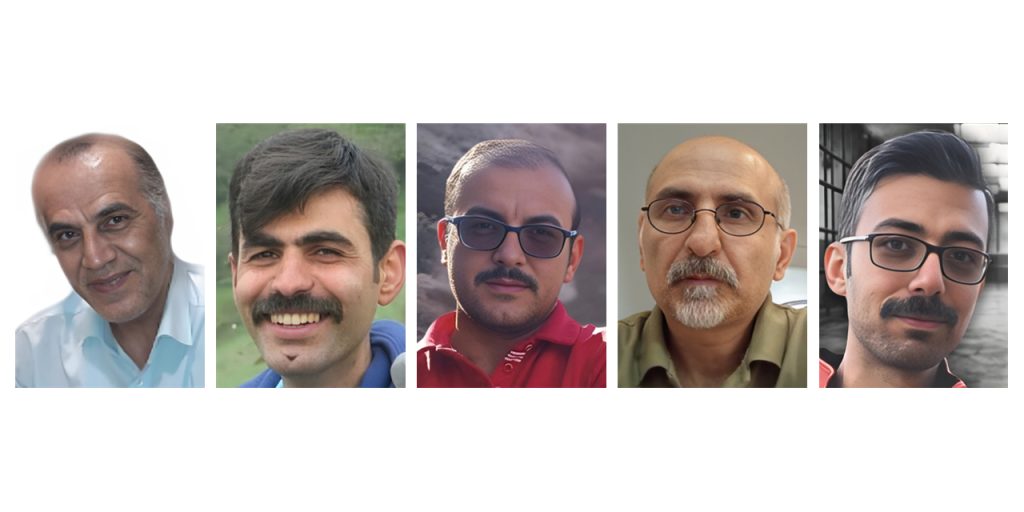London, 16 April 2025: Justice for the Victims of the 1988 Massacre in Iran (JVMI) urgently calls for international action to prevent the execution of five political prisoners who are risk of transfer from Evin Prison, Tehran, to Qezelhessar Prison (a.k.a. Qezel Hesar and Ghezel Hesar), a facility notorious for carrying out executions of political prisoners. These prisoners are at grave risk of imminent execution following death sentences imposed in November 2024.
Imminent Threat of Execution
On the morning of 16 April 2025, Hedayatollah Farzadi, head of Evin Prison, announced that the five political prisoners—Vahid Bani Amerian, Seyed Mohammad Taghavi, Babak Alipour, Pouya Ghobadi, and Shahrokh Daneshvarkar—are to be transferred from Ward 4 of Evin Prison to Qezel Hesar Prison by the end of the day, pursuant to orders from Judge Iman Afshari of Branch 26 of the Tehran Revolutionary Court. Farzadi threatened the use of force in response to the prisoners’ objections, and Ward 4 was locked down, isolating the prisoners and preventing protests.
These five individuals, along with fellow political prisoner Seyed Abolhassan Montazer, were sentenced to death on 25 November 2024 by Judge Iman Afshari, as part of a broader campaign to suppress dissent and instil fear among Iranians, particularly targeting individuals advocating for democratic freedoms and human rights.
The judicial proceedings failed to meet international standards for due process and fair trial.
The charges against these individuals — including “membership in the People’s Mojahedin Organisation of Iran (PMOI/MEK)”, “armed rebellion against the government”, and “conspiracy against national security” — are politically motivated. This constitutes a blatant violation of international human rights law, including the International Covenant on Civil and Political Rights (ICCPR), to which Iran is a state party.
Previous Transfers and Ongoing Risks
On 26 January and 3 April 2025, three other political prisoners—Behrouz Ehsani Eslamlou, Mehdi Hassani, and Seyed Abolhassan Montazer—sentenced to death on similar charges, were transferred from Evin to Qezel Hesar Prison under comparable circumstances. Ehsani and Hassani, sentenced in September 2024 for charges including “armed rebellion” and “corruption on earth,” faced trials lasting mere minutes, with no access to legal counsel for nearly two years and allegations of torture left uninvestigated, as highlighted in a prior communication from UN Special Procedures (UA IRN 1/2025, 6 February 2025).
Violations of International Human Rights Law
The death sentences violate Iran’s obligations under the International Covenant on Civil and Political Rights (ICCPR), to which Iran is a party. Article 6(2) of the ICCPR restricts the death penalty to the “most serious crimes” involving intentional killing, a standard not met by the vague and politically motivated charges in these cases. The Human Rights Committee’s General Comment No. 36 and the UN Safeguards for the Protection of the Rights of Those Facing the Death Penalty further clarify that such sentences are inconsistent with international law. Moreover, allegations of torture, denial of legal counsel, and lack of fair trial guarantees contravene Articles 7 and 14 of the ICCPR, as well as jus cogens norms prohibiting torture and arbitrary deprivation of life.
Urgent Call for Action
JVMI echoes the concerns raised in the 3 December 2024 letter to Dr. Mai Sato, UN Special Rapporteur on the situation of human rights in Iran, signed by 160 prominent individuals and organisations, including Nobel laureates and former UN officials. The letter condemned the death sentences and called for their immediate reversal, highlighting the culture of impunity in Iran as documented in the July 2024 Atrocity Crimes report by the former Special Rapporteur on Iran, Prof. Javaid Rehman.
We urgently call on the international community to act to save the lives of these political prisoners. The UN High Commissioner for Human Rights, Special Rapporteurs, and Independent Fact-Finding Mission on Iran (FFMI) should publicly condemn the death sentences and demand their immediate suspension, investigate allegations of torture, and press for Iran’s compliance with international human rights obligations.

